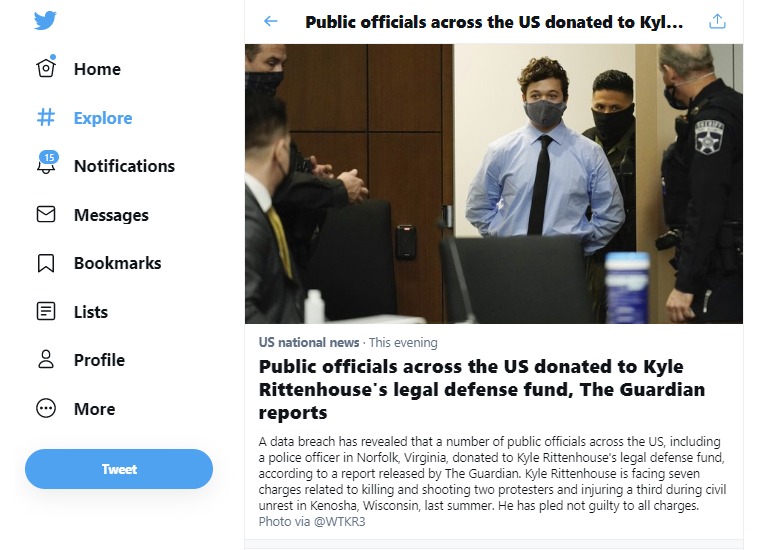Twitter is perceived as being quite sensitive to materials it says stemmed from “hacking” – just think of the Hunter Biden story fiasco (which actually didn’t involve hacking). Twitter also says it doesn’t like “doxxing” – revealing personal and sensitive private information of users online, that can lead to real world harm.
But that all seems to depend on who’s being hacked and doxxed. Reports now talk about the UK’s Guardian newspaper running a story, apparently based on material trafficked by hackers. The data aims to expose US police officers who backed their colleagues accused by the Black Lives Matter Movement.
The hackers apparently gained access to the GiveSendGo crowdfunding site.
And Twitter put this Guardian piece at the top of its trending page, which is said to be curated manually.

But the breach revealed by name which of Wisconsin police officers made small donations to help policeman Rusten Sheskey, who was in trouble after the shooting of Jacob Blake, “a knife-wielding suspect.”
Beside the ethical issue of doxxing people in highly sensitive cases like this the purpose of the Guardian story makes little obvious sense since it turned out that Sheskey was cleared by those investigating his actions.
So why would the action of his colleagues who wished to help be considered controversial? GiveSendGo is said to be a “Christian” crowdfunding platform (likely an alternative to the mainstream tech ones that have been censoring unwanted campaigns left and right), and its co-founder Jacob Wells thinks he has the answer.
“The point of this was to weaponize this information against the individuals who gave. There’s no other value other than to make them fearful,” he told the Daily Wire.
“When we started GiveSendGo, we let people give anonymously because people had such a big heart they didn’t want credit. Now where we’re at in this country, they have to give anonymously because we’ve seen what happens when their name gets out there. It makes me sick to my stomach… The point of this was to weaponize this information against the individuals who gave. There’s no other value other than to make them fearful.”
A bigger mystery still is Twitter’s behavior, since it clearly recognized the brand of business conducted by the hackers when it banned their account last summer and blocked links to the hacked data that originated from the group, which is said to have also in the past doxxed victims of ransomware.
But, as reports note, when the New York Post ran an exclusive and damning story about then presidential candidate Joe Biden and son Hunter, Twitter went out of its way to suppress it, trying to justify the unprecedented move with unsubstantiated claims that the media outlet had based the article on hacked material.













